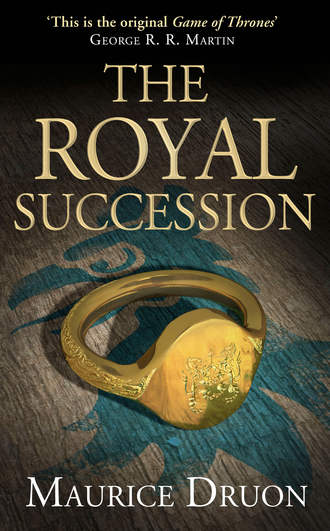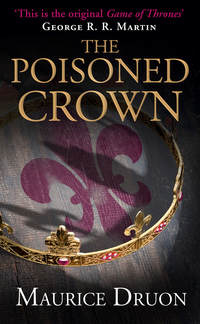
Полная версия
The Royal Succession
‘Allora, lei è il signore Guccio Baglioni?’fn1 he said, when he had finished reading.
The young man started to hear himself addressed in Italian.
‘Si, Monsignore.’
‘The Count de Bouville recommends you to me that I may take you under my protection and conceal you from the enemies who are searching for you.’
‘If you will do me that favour, Monseigneur.’
‘It appears that you have had an unfortunate adventure which has compelled you to fly in that livery,’ went on the Cardinal in his rapid, toneless voice. ‘Tell me about it. Bouville says that you formed part of his escort when he brought Queen Clémence to France. Indeed, I remember now. I saw you with him. And you are the nephew of Messire Tolomei, the Captain-General of the Lombards of Paris. Excellent, excellent! Tell me your troubles.’
He had sat down and was toying mechanically with a revolving reading-desk on which were a number of the books he used in his work. He now felt calm and relaxed, ready to distract his mind with other people’s little problems.
Guccio Baglioni had ridden three hundred miles in less than four days. He could no longer feel his limbs; there was a thick fog in his head and he would have given anything in the world to stretch himself out on the floor and sleep and sleep.
He managed to master himself; his safety, his love and his future all made it necessary that he should control his fatigue for a little longer.
‘Well, Monseigneur, I married a daughter of the nobility,’ he replied.
It seemed to him that these words had issued from another’s lips. They were not those he would have wished to utter. He would have liked to explain to the Cardinal that an unparalleled disaster had overtaken him, that he was the most crushed and harrowed of men, that his life was threatened, that he had been separated, perhaps for ever, from the one woman without whom he could not live, that this woman was to be shut up in a convent, that events had befallen them during the last two weeks with such sudden violence that time seemed to have lost its normal dimensions, and that he felt he was hardly still living in the world he knew. And yet his whole tragedy, when it had to be put into words, was reduced to the single phrase: ‘Monseigneur, I married a daughter of the nobility.’
‘Indeed,’ said the Cardinal, ‘and what is her name?’
‘Marie de Cressay.’
‘Oh, Cressay; I don’t know it.’
‘But I had to marry her secretly, Monseigneur; her family were opposed to it.’
‘Because you’re a Lombard? Naturally; they’re still rather old-fashioned in France. In Italy, of course … So you wish to obtain an annulment? Well … if the marriage was secret …’
‘No, Monseigneur, I love her and she loves me,’ said Guccio. ‘But her family has discovered that she is with child, and her brothers have pursued me to try and kill me.’
‘They may do so, they have a customary right to do so. You have put yourself in the position of a ravisher. Who married you?’
‘Father Vicenzo.’
‘Fra Vicenzo? I don’t know him.’
‘The worst of it is, Monseigneur, that the priest is dead. So I can never prove that we are really married. But don’t think I’m a coward, Monseigneur; I wanted to fight. But my uncle went and asked the advice of Messire de Bouville …’
‘… who wisely advised you to go away for a time.’
‘But Marie is going to be shut up in a convent! Do you think, Monseigneur, that you will be able to get her out? Do you think I shall ever see her again?’
‘One thing at a time, my dear son,’ replied the Cardinal, still revolving his reading-desk. ‘A convent? What better place could she be in at the moment? You must trust in God’s infinite mercy, of which we all stand in such great need.’
Guccio lowered his head with an exhausted air. His black hair was covered with dust.
‘Has your uncle good commercial relations with the Bardi?’ went on the Cardinal.
‘Indeed yes, Monseigneur. The Bardi are your bankers, I believe,’ replied Guccio with automatic politeness.
‘Yes, they are my bankers. But I find them less easy to deal with these days than they were in the past. They’ve become such an enormous concern! They have branches everywhere. And they have to refer to Florence for the smallest demand. They’re as slow as an Ecclesiastical Court. Has your uncle many prelates among his customers?’
Guccio’s cares were far removed from the bank. The fog was growing thicker in his head; his eyelids were burning.
‘We have mostly the great barons,’ he said, ‘the Count of Valois, the Count of Artois. We should be greatly honoured, Monseigneur …’
‘We’ll talk of that later. For the moment you’re in the shelter of this monastery. You will pass for a man in my employ; perhaps we’ll make you wear a clerk’s robe. I’ll talk to my chaplain about it. You can take off that livery and go and sleep in peace; that appears to be what you need the most.’
Guccio bowed, muttered a few words of gratitude and went to the door. Then, coming to a halt, he said: ‘I can’t undress yet, Monseigneur; I’ve got another message to deliver.’
‘To whom?’ asked Duèze somewhat suspiciously.
‘To the Count of Poitiers.’
‘Give me the letter; I’ll send it later by one of the brothers.’
‘But, Monseigneur, Messire de Bouville was very insistent …’
‘Do you know if the message concerns the Conclave?’
‘Oh, no, Monseigneur! It’s about the King’s death.’
The Cardinal leapt from his chair.
‘King Louis is dead? But why didn’t you say so at once?’
‘Isn’t it known here? I thought you would have been informed, Monseigneur.’
In fact, he wasn’t thinking at all. His misfortunes and his fatigue had made him forget this capital event. He had galloped all the way from Paris, changing horses in the monasteries whose names he had been given, eating hastily and talking as little as possible. Without knowing it, he had forestalled the official couriers.
‘What did he die of?’
‘That’s precisely what Messire de Bouville wants to tell the Count of Poitiers.’
‘Murder?’ whispered Duèze.
‘It seems the King was poisoned.’
The Cardinal thought for a moment.
‘That may alter many things,’ he murmured. ‘Has a regent been appointed?’
‘I don’t know, Monseigneur. When I left, everyone was talking of the Count of Valois.’
‘All right, my dear son, go and rest.’
‘But, Monseigneur, what about the Count of Poitiers?’
The prelate’s thin lips sketched a rapid smile, which might have passed for an expression of goodwill.
‘It would not be prudent for you to show yourself; moreover, you’re dropping with fatigue,’ he said. ‘Give me the letter; and so that no one can reproach you, I’ll give it him myself.’
A few minutes later, preceded by a linkman, as his dignity required, and followed by a secretary, the Cardinal in Curia left the Abbey of Ainay, between the Rhône and the Saône, and went out into the dark alleys, which were often made narrower still by heaps of filth. Thin and slight, he seemed to skip along, almost running in spite of his seventy-two years. His purple robe appeared to dance between the walls.
The bells of the twenty churches and forty-two monasteries of Lyons rang for the first office. Distances were short in this city, which numbered barely twenty thousand inhabitants, of whom half were engaged in the commerce of religion and the other half in the religion of commerce. The Cardinal soon reached the house of the Consul, where lodged the Count of Poitiers.
3
The Gates of Lyons

THE COUNT OF POITIERS was just finishing dressing when his chamberlain announced the Cardinal’s visit.
Very tall, very thin, with a prominent nose, his hair lying across his forehead in short locks and falling in curls about his cheeks, his skin fresh as it may be at twenty-three, the young Prince, clothed in a dressing-gown of shot camocas, greeted Monseigneur Duèze, kissing his ring with deference.
It would have been difficult to find a greater contrast, a more ironical dissimilarity than between these two figures, one like a ferret just emerged from its earth, the other like a heron stalking haughtily across the marshes.
‘In spite of the early hour, Monseigneur,’ said the Cardinal, ‘I did not wish to defer bringing you my prayers in the loss you have suffered.’
‘The loss?’ said Philippe of Poitiers with a slight start.
His first thought was for his wife, Jeanne, whom he had left in Paris and who had been pregnant for eight months.
‘I see that I have done well to come and tell you,’ went on Duèze. ‘The King, your brother, died five days ago.’
Philippe stood perfectly still; his chest barely moved as he drew a deep breath. His face was expressionless, showing no surprise or emotion – or even impatience for further details.
‘I am grateful to you for your alacrity, Monseigneur,’ he replied. ‘But how have you managed to hear the news before myself?’
‘From Messire de Bouville, whose messenger has ridden in haste so that I may give you this letter secretly.’
The Count of Poitiers broke the seals and read the letter, holding it close to his nose for he was very short-sighted. Again, he betrayed no sign of emotion; when he had finished reading, he merely slipped the letter into his gown. But he said no word.
The Cardinal also remained silent, pretending to respect the Prince’s sorrow, although he showed no great signs of affliction.
‘God preserve him from the pains of Hell,’ said the Count of Poitiers at last, to complement the prelate’s devout expression.
‘Yes … Hell,’ Duèze murmured. ‘Anyway, let us pray to God. I am also thinking of the unfortunate Queen Clémence, whom I saw grow up when I was with the King of Naples. So sweet and perfect a Princess …’
‘Yes, it’s a great misfortune for my sister-in-law,’ said Poitiers. And as he said it, he thought: ‘Louis has left no testamentary disposition for a regency. Already, from what Bouville writes, my Uncle Valois is at work …’
‘What are you going to do, Monseigneur? Will you return to Paris immediately?’ the Cardinal asked.
‘I don’t know, I don’t yet know,’ replied Poitiers. ‘I shall wait for more information. I shall hold myself at the disposition of the kingdom.’
In his letter Bouville had not concealed the fact that he wished for Poitiers’s return. As the elder of the dead King’s brothers, and as a peer of the kingdom, Poitiers’s place was at the Council of the Crown in which, at the very first meeting, dissension had broken out over the appointment of a regent.
But, on the other hand, Philippe of Poitiers felt regret, even reluctance, at having to leave Lyons before he had completed the tasks he had undertaken.
In the first place he had to conclude the contract of betrothal between his third daughter, Isabelle, who was barely five years of age, and the Dauphiniet of Viennois, the little Guigues, who was six. He had negotiated this marriage, at Vienne itself, with the Dauphin Jean II de la Tour du Pin and the Dauphine Beatrice, sister of Queen Clémence. It was a good alliance, which would allow the Crown of France to counterbalance the influence of Anjou-Sicily in this region. The document was to be signed in a few days’ time.4
And then, above all, there was the papal election. During the last weeks Philippe of Poitiers had journeyed backwards and forwards across Provence, Viennois and Lyonnais, interviewing each of the twenty-four scattered Cardinals in turn;5 assuring them that the aggression of Carpentras would not be repeated and that they would be subjected to no violence; giving many of them to understand that they might have a chance of election and pleading for the prestige of the Faith, the dignity of the Church and the interests of the States. Ultimately, as a result of much effort, talk and money, he had succeeded in gathering them at Lyons, a town which had long been under ecclesiastical authority but had passed recently, during the last years of Philip the Fair, into the power of the King of France.
The Count of Poitiers felt that he was on the point of reaching his goal. But if he left, would not the dissensions begin all over again, personal hatreds flourish once more, the influence of the Roman nobility or that of the King of Naples supplant that of France, while the various parties accused each other of heresy? Would not the papacy return to Rome? ‘Which my father so much wished to avoid,’ Philippe of Poitiers said to himself. ‘Is his work, already so much damaged by Louis and by our Uncle Valois, to be destroyed completely?’
For a few moments Cardinal Duèze felt that the young man had forgotten his presence. But suddenly Poitiers asked: ‘Will the Gascon party maintain the candidature of Cardinal de Pélagrue? Do you think that your pious colleagues are at last prepared to sit in Conclave? Sit down here, Monseigneur, and tell me your thoughts on the matter. How far have we advanced?’
The Cardinal had seen many sovereigns and ministers during the third of a century he had been concerned with the affairs of kingdoms, but he had never before met one with such self-control. Here was a Prince, aged twenty-three, to whom he had just announced the death of his brother and the vacancy of the throne, and he seemed to have no more urgent concern than the complications of the Conclave.
Sitting side by side near a window, on a chest covered with damask, the Cardinal’s feet barely touching the ground and the Count of Poitiers’s thin ankle slowly moving from side to side, the two men had a long conversation. It appeared from Duèze’s summary of the situation that they were more or less back where they had been two years ago, after the death of Clement V.
The party of the ten Gascon Cardinals, which was also called the French Party, was still the largest, but not large enough by itself to ensure the necessary majority of two-thirds of the Sacred College: sixteen votes. The Gascons considered themselves the depositories of the late Pope’s thought. They all owed their hats to him, held out firmly for the see of Avignon and showed themselves remarkably united against the other two parties. But there was a good deal of secret competition among them; the ambitions of Arnaud de Fougères, Arnaud Nouvel and Arnaud de Pélagrue all flourished. They made mutual promises while scheming for one another’s downfall.
‘The war of the three Arnauds,’ said Duèze in his whispering voice. ‘Now let’s have a look at the Italian Party.’
There were only eight of them, but divided into three sections. The redoubtable Cardinal Caetani, nephew of Pope Boniface VIII, was opposed to the two Cardinals Colonna by a time-honoured family feud which had become an inexorable hatred since the Anagni affair and the blow in the face Colonna had given Boniface. The other Italians wavered between these adversaries. Stefaneschi, from hostility to Philip the Fair’s policy, supported Caetani, whose relation moreover he was. Napoléon Orsini tacked about. The eight were only agreed on a single point: the return of the papacy to the Eternal City. On that point they were fiercely determined.
‘You know well, Monseigneur,’ continued Duèze, ‘that at one moment we ran the risk of schism; and indeed we still do so. Our Italians refused to meet in France and they let it be known, but a little while ago, that if a Gascon Pope were elected, they would refuse him recognition and would set up a Pope of their own in Rome.’
‘There will be no schism,’ said the Count of Poitiers calmly.
‘Thanks to you, Monseigneur, thanks to you. I am happy to recognize it, and I tell everyone so. Going, as you have, from town to town with sage advice, if you have not yet found the shepherd, you have at least gathered the flock.’
‘Expensive sheep, Monseigneur! Do you know that I left Paris with sixteen thousand livres, and that only the other week I had to have as much again sent to me? Jason was nothing compared to me. I hope that all these golden fleeces won’t slip through my fingers,’ said the Count of Poitiers, screwing up his eyes slightly to look the Cardinal in the face.
The Cardinal, who had done very well out of this largesse by roundabout ways, did not take up the allusion directly but replied: ‘I think that Napoléon Orsini and Albertini de Prato, and perhaps even Guillaume de Longis, who was Chancellor to the King of Naples before me, might be fairly easily detached. Avoiding schism is worth the price.’
Poitiers thought: ‘He has used the money we gave him to acquire three of the Italian votes. It’s clever of him.’
As for Caetani, though he continued to play an implacable game, he was not in so strong a position since his practice of sorcery and his attempt to cast a spell on the King of France and the Count of Poitiers himself had been discovered. The ex-Templar Everard, a half-wit, whom Caetani had used for his devilish work, had talked rather too much before giving himself up to the King’s men.
‘I am holding that matter in reserve,’ said the Count of Poitiers. ‘The smell of the faggots might, at the right moment, make Monseigneur Caetani a little more pliant.’
At the thought of seeing another Cardinal grilled, a very slight and furtive smile passed over the aged prelate’s thin lips.
‘It seems that Francesco Caetani’, he went on, ‘has quite abandoned God’s affairs to devote himself entirely to Satan’s. Do you think that, having failed with sorcery, he managed to strike at the King, your brother, with poison?’
The Count of Poitiers shrugged his shoulders.
‘Whenever a king dies, it’s asserted that he was poisoned,’ he said. ‘It was said of my ancestor, Louis VIII; it was said of my father, whom God keep. My brother’s health was poor enough. Still, one must take the possibility into account.’
‘Finally,’ Duèze went on, ‘there is the third party, which is called Provençal because of the most turbulent among us, Cardinal de Mandagout.’
This last party numbered only six Cardinals of diverse origin; southerners, such as the brothers Bérenger Frédol, were allied in it with Normans and with one member from Quercy, Duèze himself.
The gold lavished on them by Philippe of Poitiers had made them more receptive to the arguments of French policy.
‘We are the smallest, we are the weakest,’ said Duèze, ‘but our votes are decisive in any majority. And since the Gascons and the Italians each refuse to elect a Pope from the other party, then, Monseigneur …’
‘They’ll have to take a Pope from your party, won’t they?’
‘I believe so, I firmly believe so. I’ve said so ever since Clement died. No one listened to me; doubtless people thought I was preaching on my own behalf, for indeed my name had been mentioned without my wishing it. But the Court of France has never placed much confidence in me.’
‘It was because you were rather too openly supported by the Court of Naples, Monseigneur.’
‘And had I not been supported by someone, Monseigneur, who would have paid any heed to me at all? Believe me, I have no other ambition than to see a little order restored to the affairs of Christendom which are in a bad way; it will be a heavy task for the next successor to Saint Peter.’
The Count of Poitiers clasped his long hands together before his face and thought for a few seconds.
‘Do you think, Monseigneur,’ he asked, ‘that the Italians would agree to the Holy See remaining in Avignon in return for the satisfaction of not having a Gascon Pope, and that the Gascons, in return for the certainty of Avignon, would agree to renounce their own candidate and rally to your third party?’
By which he in fact meant: ‘If you, Monseigneur Duèze, became Pope with my support, would you formally agree to preserving the present residence of the papacy?’
Duèze perfectly understood.
‘It would, Monseigneur,’ he replied, ‘be the wise solution.’
‘I am grateful for your valuable advice,’ said Philippe of Poitiers, rising to his feet to put an end to the audience.
He showed the Cardinal out.
When two men, who to all seeming are utterly diverse in age, appearance, experience and position, recognize each other as of similar quality and believe that mutual collaboration and friendship are possible between them, it is due more to the mysterious conjunctions of destiny than to the words they may exchange.
When Philippe bowed to kiss his ring, the Cardinal murmured, ‘You would make an excellent regent, Monseigneur.’
Philippe straightened up. ‘Does he realize that I have been thinking all this time of nothing else?’ he wondered. And he replied: ‘Would you not yourself, Monseigneur, make an excellent Pope?’
And they could not help smiling discreetly to each other, the old man with a sort of paternal affection, the young man with friendly deference.
‘I will be beholden to you,’ Philippe added, ‘if you will keep secret the grave news you have brought me until it is publicly announced.’
‘I will do so, Monseigneur, in order to serve you.’
Left alone, the Count of Poitiers reflected only for a few seconds. Then he summoned his first chamberlain.
‘Adam Héron, has no courier arrived from Paris?’ he asked.
‘No, Monseigneur.’
‘Then close all the gates of Lyons.’
4
Let us Dry our Tears

THAT MORNING THE PEOPLE of Lyons were without vegetables. The market-gardeners’ wagons had been stopped outside the walls, and the housewives were clamouring in the empty markets. The only bridge, that over the Saône (for the one over the Rhône had not yet been completed), was barred by soldiery. But if one could not enter Lyons, one could not leave it either. Italian merchants, travellers, itinerant friars, reinforced by loungers and idlers, gathered about the gates and demanded an explanation. The guard invariably replied: ‘The Count of Poitiers’s orders,’ with the distant and important air that agents of authority tend to adopt when executing an order they do not understand.
People were shouting:
‘But my daughter is ill at Fouvière …’
‘My barn at Saint-Just burned down yesterday at vespers …’
‘The bailiff of Villefranche will have me arrested if I don’t take him my poll-tax today …’
‘The Count of Poitiers’s orders!’
And when the crowd began to press forward, the royal sergeants-at-arms raised their maces.
There were strange rumours going round the town.
Some declared that there was going to be war. But with whom? No one could say. Others asserted that a bloody riot had taken place during the night near the Augustinian monastery between the King’s men and those of the Italian Cardinals. Horses had been heard going by. Even the number of the dead was mentioned. But at the Augustinians’ all was quiet.
The Archbishop, Pierre de Savoie, was very anxious, wondering whether the events which had taken place before 1312 were about to begin all over again and whether he would be compelled to abandon, to the advantage of the archbishopric of Sens, the primacy of the Gaules, the only prerogative he had succeeded in preserving when Lyons had been attached to the Crown.6 He had sent one of his canons for news; but the canon, having gone to the Count of Poitiers’s lodging, had been met by a curtly silent equerry. And now the Archbishop was expecting an ultimatum.
The Cardinals, who were lodged in various religious houses, were no less anxious and, indeed, inclined to panic. Were they to be treated as they had been at Carpentras? But how could they escape this time? Messengers rushed from the Augustinians to the Franciscans and from the Jacobins to the Carthusians. Cardinal Caetani had sent his general assistant, the Abbé Pierre, to Napoléon Orsini, to Albertini de Prato and to Flisco, the only Spaniard, with orders to say to those prelates: ‘Look what has happened! You let yourselves be persuaded by the Count of Poitiers. He swore not to molest us, that we should not even have to go into seclusion to vote, and that we should be completely free. And now he has shut us up in Lyons!’








